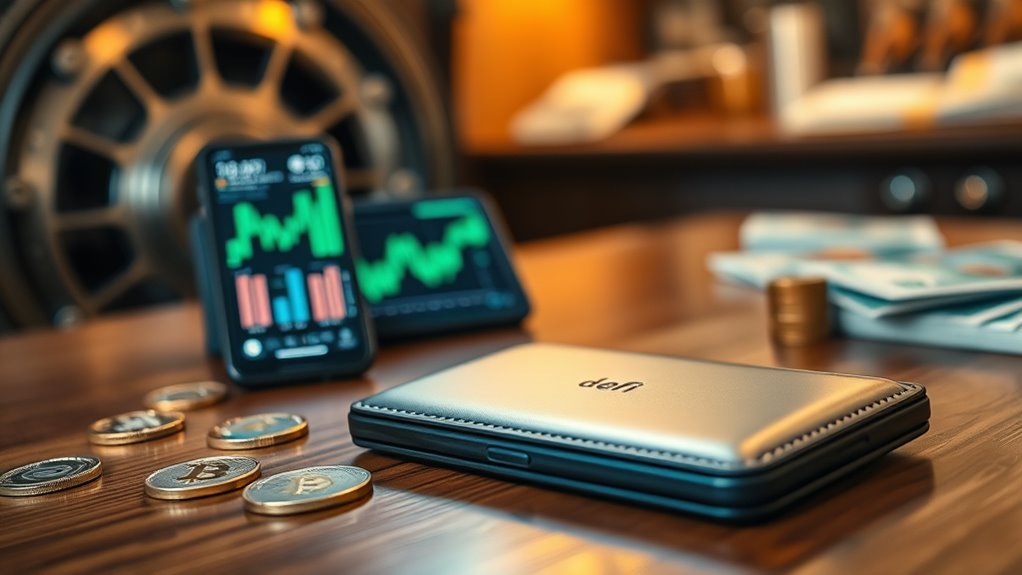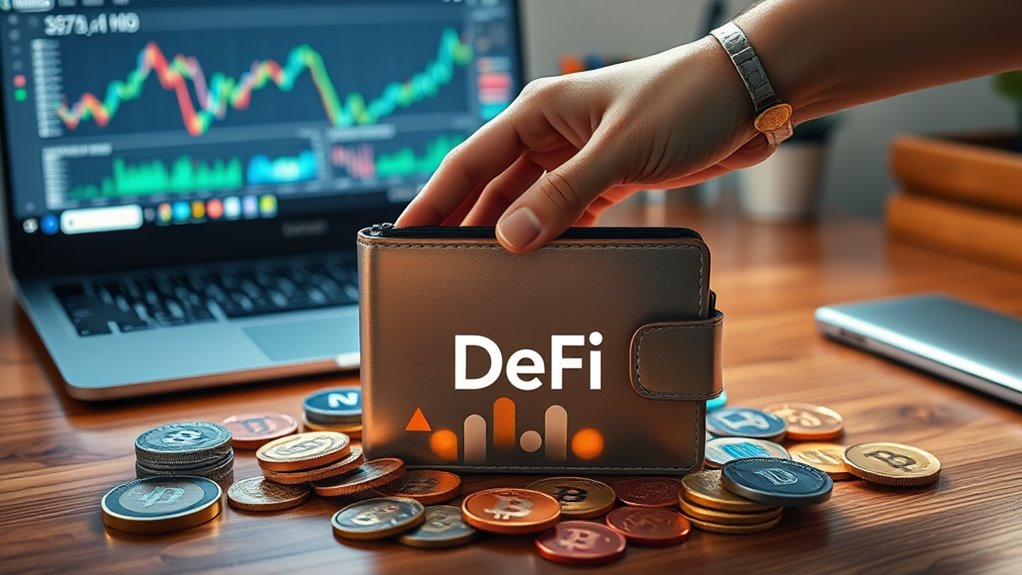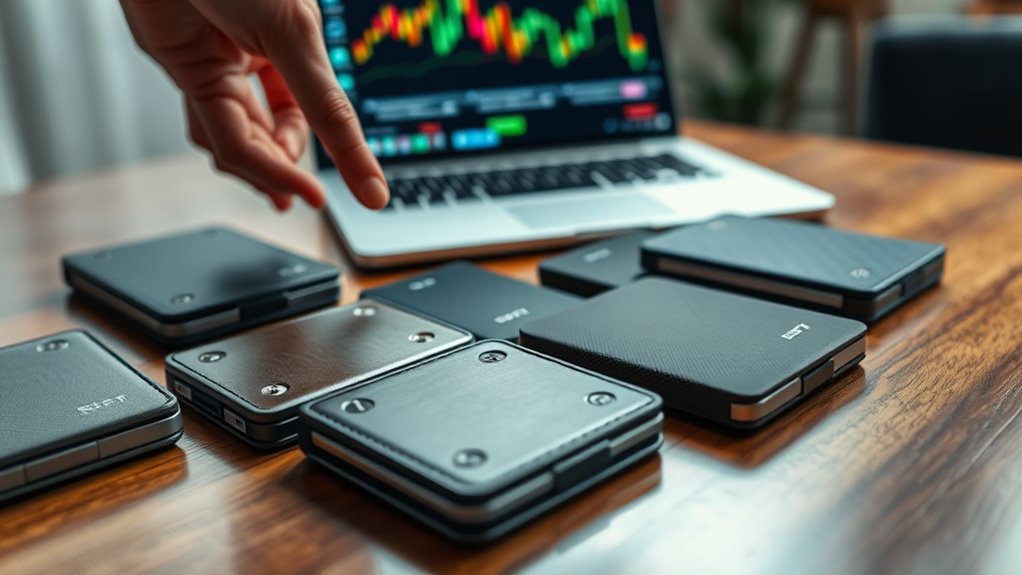
DeFi Wallets: Unlocking the Power of Crypto Control
DeFi wallets empower users with direct control over their cryptocurrencies through non-custodial key management. Unlike traditional wallets, they eliminate intermediaries while offering seamless integration with decentralized applications for lending, trading, and yield farming. These wallets provide enhanced security through features like multi-factor authentication and hardware options, alongside unrestricted global access to funds. Users benefit from increased privacy without KYC requirements and censorship resistance. Understanding wallet types and security practices reveals the full potential of decentralized finance.
Key Takeaways
- DeFi wallets provide self-custody of private keys, giving users complete control over their cryptocurrency assets without intermediaries.
- Users can directly access diverse financial services like lending platforms, decentralized exchanges, and yield farming opportunities.
- Multiple security layers including private key encryption, two-factor authentication, and optional hardware wallet integration protect digital assets.
- DeFi wallets support various blockchain networks, offering flexibility to manage different cryptocurrencies in one interface.
- These wallets preserve financial privacy by requiring no KYC verification while providing 24/7 global access to funds.
What Makes Defi Wallets Different From Traditional Options

While traditional financial systems rely on intermediaries to manage user funds, DeFi wallets represent a fundamental shift in how people control their digital assets. These non-custodial solutions give users complete autonomy through self-custody of private keys, eliminating the need for third-party oversight.
Unlike conventional wallets, DeFi wallets offer direct integration with decentralized applications, enabling seamless access to lending platforms, decentralized exchanges, and yield farming opportunities. This integration extends across multiple blockchain networks, providing flexibility not found in traditional options.
DeFi wallets seamlessly connect users to a universe of decentralized financial tools across multiple networks, offering unprecedented flexibility and control.
The decentralized nature of these wallets greatly reduces security risks associated with centralized control while expanding access to financial services globally. Additionally, they empower users to engage in peer-to-peer financial systems without the constraints of centralized gatekeepers.
With both software versions (like MetaMask) and hardware options (such as Ledger), users can choose security levels that match their needs while maintaining direct control of their assets.
The Inner Workings of DeFi Wallet Security

Three fundamental principles form the backbone of DeFi wallet security: encryption, private key management, and non-custodial control. These elements guarantee users maintain complete ownership of their digital assets while protecting them from unauthorized access.
DeFi wallets utilize public-private key pairs, where the public key allows receiving funds while the private key, often secured through seed phrases, authorizes transactions. For enhanced protection, many wallets implement two-factor authentication and support hardware wallet integration for offline key storage.
Unlike traditional banking systems, users bear responsibility for safeguarding their access credentials. This means protecting private keys, using strong passwords, and remaining vigilant against phishing attempts. Additionally, understanding how crypto wallets function is crucial for maximizing security and effectively managing digital assets.
Regular wallet software updates are also essential to address emerging vulnerabilities in this rapidly evolving technological landscape.
Top Benefits of Managing Your Crypto With Defi Wallets

DeFi wallets provide users with full control over their cryptocurrency assets, eliminating the need for third-party custodians who might restrict access or impose limitations.
Advanced security features, including private key management and optional multi-signature authentication, protect users’ digital assets more effectively than centralized alternatives.
These wallets offer unrestricted global access to crypto funds and DeFi services 24 hours a day, regardless of location or time zone, enabling truly borderless financial participation. Additionally, they facilitate seamless integration with DeFi lending platforms, allowing users to easily lend or borrow assets using their wallets.
Full Asset Control
Ownership stands as the cornerstone of cryptocurrency’s original vision, and DeFi wallets deliver on this promise by providing users with complete control over their digital assets. With private keys securely in their possession, users maintain permanent access to their funds without fear of third-party interference, account freezes, or asset confiscation.
| Asset Control Feature | Benefit to User |
|---|---|
| Private Key Ownership | Direct asset management without intermediaries |
| Unrestricted Transactions | Freedom to send/receive funds 24/7 worldwide |
| No KYC Requirements | Enhanced privacy and reduced identity exposure |
| Censorship Resistance | Protection from regulatory restrictions |
| Permanent Access | Assets remain accessible as long as keys are secure |
This level of autonomy guarantees users can conduct financial activities globally without traditional banking limitations, while transparent blockchain records maintain accountability without compromising user sovereignty. Additionally, greater financial inclusivity through DeFi wallets allows users to engage with financial services that may have been previously inaccessible.
Enhanced Security Features
While digital asset ownership provides freedom, security remains the paramount concern for cryptocurrency holders. DeFi wallets address this through thorough protection mechanisms that safeguard users’ investments.
Non-custodial control stands as the cornerstone feature, ensuring users maintain full authority over their assets without third-party involvement. This autonomy is reinforced through private key management systems that shield sensitive access credentials from unauthorized parties.
Multi-factor authentication provides additional security layers, requiring multiple verification methods before authorizing transactions.
Regular smart contract audits minimize vulnerabilities in the underlying code, protecting users from potential exploits. Anti-phishing protections warn users of suspicious activity, helping them avoid common cryptocurrency scams.
Additionally, implementing two-factor authentication adds an extra layer of protection against unauthorized access, further enhancing overall security.
These security measures work in concert to create a robust defense system, allowing users to navigate the cryptocurrency ecosystem with greater confidence and reduced risk.
Global 24/7 Access
Wherever users find themselves across the global landscape, cryptocurrency remains accessible through DeFi wallets that operate continuously without interruption. These wallets enable instant transactions regardless of time zones or banking hours, offering true financial autonomy. Additionally, DeFi wallets are essential for interacting with dapps, allowing users to harness the full potential of decentralized finance.
| Feature | Benefit | Real-World Application |
|---|---|---|
| Borderless Transactions | Send funds globally without intermediaries | International remittances without delays |
| Continuous Availability | Access assets 24/7/365 | Trading during market opportunities at any hour |
| Multi-Blockchain Support | Interact with various networks | Diversify holdings across Ethereum, Solana, etc. |
| Direct DApp Integration | Use financial services seamlessly | Lend assets on Aave or trade on Uniswap directly |
Unlike traditional banking systems with operating hours and geographic limitations, DeFi wallets provide constant access to digital assets, creating a truly globalized financial experience.
Comparing Different DeFi Wallet Types for Your Needs

Three primary types of DeFi wallets serve different user needs in the cryptocurrency ecosystem: hot wallets, cold wallets, and hybrid solutions.
Hot wallets, such as MetaMask and Trust Wallet, offer convenient online access through mobile apps or browser extensions, providing seamless dApp integration and user-friendly interfaces.
Hot wallets provide on-the-go cryptocurrency access with intuitive interfaces, making dApp interactions effortless for everyday users.
Cold wallets, like those integrated with Ledger Live, prioritize security by storing private keys offline, protecting assets from online threats.
Hybrid solutions combine aspects of both, offering enhanced security with reasonable accessibility.
When selecting a wallet, users should consider blockchain compatibility, security features, and user interface.
MetaMask excels in dApp integration and customization, while Trust Wallet offers extensive blockchain support.
Exodus provides a balance of usability and multi-chain functionality, making it suitable for those managing diverse crypto portfolios. Additionally, users should be aware of the importance of security features when choosing their wallets to safeguard their assets against potential threats.
Essential Security Practices for Protecting Your Digital Assets

Securing digital assets in DeFi requires rigorous attention to private key management, as these cryptographic keys provide direct access to funds and must never be shared or stored online.
Implementing multi-factor authentication adds essential layers of security by requiring multiple verification methods before granting access to wallets or platforms.
Users should remain vigilant against phishing attempts by verifying website URLs, avoiding suspicious links, and never sharing seed phrases or private keys in response to messages, emails, or pop-ups claiming to be from wallet providers. Additionally, utilizing hardware wallets can significantly enhance the security of your private keys, keeping them offline and less susceptible to hacks.
Private Key Safeguarding
The foundation of cryptocurrency security rests upon the proper management of private keys, which function as the ultimate proof of ownership for digital assets. Unlike public keys that can be freely shared, private keys must be zealously protected from unauthorized access.
Effective safeguarding strategies include hardware wallets like Ledger or Trezor that store keys offline, encrypted USB drives kept disconnected when not in use, and properly secured paper wallets.
For enhanced protection, users can implement distributed key management through multi-signature wallets or Shamir’s Secret Sharing, which divides keys into multiple parts.
Common security vulnerabilities stem from human error, including poor key generation practices, phishing susceptibility, and inadequate storage methods.
Regular security audits, proper encryption, and physical security measures are essential for maintaining long-term protection of these critical digital signatures. Additionally, utilizing secure wallet solutions can greatly improve the overall safety of your digital assets.
Multi-Factor Authentication Implementation
Multi-factor authentication (MFA) represents a critical defense mechanism in the cryptocurrency security landscape, requiring users to verify their identity through multiple independent methods before accessing their digital assets.
DeFi wallet users can implement MFA through various verification methods including SMS codes, authenticator apps, and biometric data. Hardware tokens provide an additional robust layer of protection against unauthorized access.
When properly implemented, MFA can block 99.9% of automated attacks, including credential stuffing and phishing attempts. Additionally, using a secure exchange with strong security practices can further enhance the safety of your assets.
While some users may find the technical setup challenging, the security benefits far outweigh the initial inconvenience. For peak protection, users should maintain regular updates of MFA tools, establish backup authentication options, and combine these measures with strong password practices.
This balanced approach guarantees both security and accessibility when managing cryptocurrency assets.
Avoid Phishing Scams
How effectively cryptocurrency holders protect their private keys often determines whether their digital assets remain secure in an increasingly hostile online environment.
Phishing attacks, which have increased by over 50% in recent years, manipulate users into revealing sensitive information like seed phrases or approving malicious transactions.
Users should carefully verify website URLs, avoiding suspicious links from emails or messaging apps. Red flags include grammatical errors, too-good-to-be-true offers, and unverified sources.
If compromised, immediate action is necessary: disconnect from the internet, change passwords, notify wallet providers, and consider freezing accounts.
Preventative measures include using official channels for services, maintaining secure connections through VPNs, keeping wallet software updated, and educating oneself about common phishing tactics.
Since cryptocurrency lacks FDIC insurance, vigilance against these deceptive practices is essential to prevent irreversible financial losses.
Advanced Features That Enhance Your DeFi Experience

Modern DeFi wallets now offer sophisticated features that go far beyond basic cryptocurrency storage and transfer capabilities.
These advancements enhance both security and functionality for users traversing the decentralized finance landscape.
Multi-signature support requires multiple approvals for transactions, while hardware wallet integration keeps private keys secure offline.
Many wallets now support biometric authentication and implement AI-driven fraud prevention to protect assets.
Cross-chain compatibility allows users to manage assets across different blockchains through a single interface.
Integration with decentralized exchanges enables direct token swaps without leaving the wallet environment.
Users can also access staking and yield farming opportunities, maximizing potential returns on their digital assets.
Customizable dashboards and responsive designs guarantee these powerful features remain accessible to both beginners and experienced users across various devices.
Frequently Asked Questions
What Fees Are Typically Associated With Defi Wallet Transactions?
DeFi wallet transactions typically involve network fees, gas fees, withdrawal fees, smart contract interaction fees, and exchange fees. These costs vary based on network demand, consensus mechanism, and transaction complexity.
Can I Recover My Assets if I Lose My Seed Phrase?
Recovering assets without a seed phrase is extremely difficult. Users may try contacting wallet support, professional recovery services, or checking old devices, but success is rarely guaranteed and often impossible with decentralized wallets.
How Do I Connect My Defi Wallet to Exchanges?
Users may interface their digital repositories with trading platforms by selecting the wallet connect option, scanning a QR code, or using API keys while ensuring proper authentication and blockchain network compatibility is maintained.
Are Defi Wallets Compatible With NFT Marketplaces?
Yes, most DeFi wallets are compatible with NFT marketplaces. They typically feature built-in browsers and dApp integration that allow users to connect directly to popular NFT platforms for buying, selling, and managing digital collectibles.
What Regulations Affect Defi Wallets in Different Countries?
An ocean of regulations affects DeFi wallets globally. Different jurisdictions implement varying KYC requirements, AML standards, licensing frameworks, and tax treatments. The EU’s MiCA, US multi-agency oversight, and Singapore’s licensing system exemplify these regional approaches.
Conclusion
As users dive headfirst into DeFi wallets‘ brave new world, they can be comforted knowing their crypto is “perfectly secure”—until they write their seed phrase on a sticky note or click that suspiciously urgent verification link. DeFi wallets offer unprecedented control and access to financial tools, proving once again that humanity’s greatest achievement is creating new ways to misplace valuable assets, this time without the hassle of physical banks.














